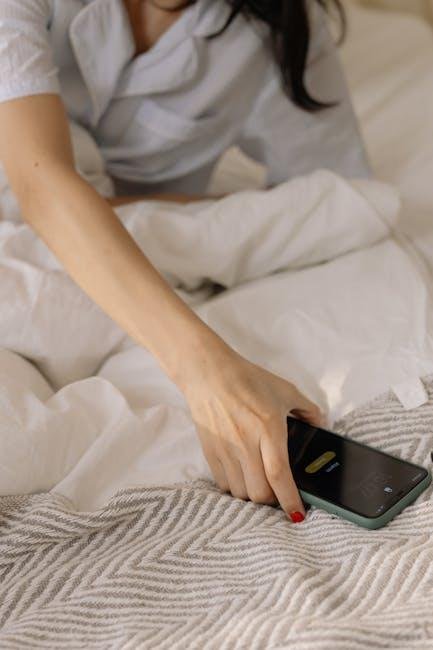In today’s digital age, screens are everywhere—from the moment we wake up to when we finally hit the hay. While our devices keep us connected and entertained, they can also sneakily interfere with one of our most important needs: a good night’s sleep. If you’ve ever found yourself tossing and turning after scrolling through your phone, you’re definitely not alone. But don’t worry! In this post, we’ll explore how screen time impacts your sleep and share some easy, practical tips to help you wind down and catch those precious Zzz’s more peacefully. Let’s dive in!
Table of Contents
- How Blue Light Affects Your Body Clock
- Common Sleep Problems Linked to Excess Screen Time
- Simple Evening Habits to Improve Your Sleep Quality
- Tech Tools and Apps That Help You Unplug Effortlessly
- In Retrospect
How Blue Light Affects Your Body Clock
Exposure to blue light, especially during the evening, can send mixed signals to your brain. This high-energy visible (HEV) light suppresses the production of melatonin, the hormone responsible for making you feel sleepy. When your body doesn’t get the cue that it’s bedtime, your internal clock, or circadian rhythm, becomes confused. This disruption can delay sleep onset and reduce the overall quality of your rest.
The impact of too much blue light goes beyond just feeling tired. It can interfere with memory, mood, and even your immune system. Luckily, making small changes can help you reclaim control. Here are a few easy tweaks to protect your body’s natural rhythm:
- Use blue light filters or night mode on your devices in the evening.
- Limit screen time at least an hour before bed.
- Try warm, dim lighting in your living spaces as bedtime approaches.
Common Sleep Problems Linked to Excess Screen Time
Spending too much time in front of screens can seriously disrupt your natural sleep rhythm. When your eyes are exposed to the blue light emitted by smartphones, tablets, and computers, it tricks your brain into thinking it’s still daytime. This suppresses the production of melatonin, the hormone responsible for making you feel sleepy, leading to difficulty falling asleep and poorer sleep quality. Over time, this disturbance can morph into chronic issues like insomnia or irregular sleep patterns.
Beyond just trouble nodding off, excess screen time can cause a cascade of other sleep-related frustrations. Many people experience:
- Frequent nighttime awakenings, leaving you tired in the morning.
- Reduced REM sleep, which impacts memory consolidation and emotional health.
- Morning grogginess, making it hard to start the day energized.
Recognizing these problems is the first step toward better sleep health, especially in today’s screen-filled world.
Simple Evening Habits to Improve Your Sleep Quality
Establishing calming rituals before bedtime can significantly enhance your sleep quality. Try dimming the lights and engaging in activities that don’t involve screens, such as reading a physical book, journaling your thoughts, or practicing gentle stretching. These habits help signal your brain to wind down, promoting the release of melatonin—a hormone crucial for restful sleep. Avoiding the blue light emitted by phones, tablets, or laptops at least an hour before bed allows your internal clock to naturally prepare for rest.
Incorporate these simple changes into your evening routine for better rest:
- Set a digital curfew: Turn off all screens 60 minutes before bedtime.
- Use warm, soft lighting: Opt for lamps or candles to create a cozy ambiance.
- Practice relaxation techniques: Deep breathing or meditation can ease your mind and body.
- Create a tech-free zone: Keep devices out of the bedroom to minimize temptation.
With these adjustments, you’ll pave the way for more refreshing and uninterrupted sleep, making your mornings brighter and more energized.
Tech Tools and Apps That Help You Unplug Effortlessly
In a world buzzing with notifications, finding the right digital companions to help you unplug can feel like a lifesaver. Luckily, technology itself offers tools designed to gently guide you away from screen overload. Apps like Forest encourage you to focus by planting virtual trees that grow as you resist the urge to check your phone. Meanwhile, Moment tracks your daily screen usage and nudges you toward healthier habits, all while offering insightful reports that turn awareness into action. These tools aren’t about restricting freedom; they’re about creating space to breathe.
For those who want a more hands-off approach, setting up built-in features such as Apple’s Screen Time or Android’s Digital Wellbeing can work wonders. These allow you to schedule downtime or app limits in advance, so you don’t have to think twice when it’s time to disconnect. Pair these with smart home devices that dim lights or play calming music at your preferred bedtime, and you’ve got a modern toolkit designed to reclaim your nights effortlessly.
- Focus apps: Forest, Focus@Will
- Screen tracking: Moment, RescueTime
- Built-in tools: Apple Screen Time, Android Digital Wellbeing
- Smart devices: Philips Hue lights, Google Home routine
In Retrospect
Wrapping things up, understanding how screen time affects your sleep is the first step towards better rest—and better days. By making small, simple tweaks like setting a digital curfew or swapping screens for a good book before bed, you can reclaim your nights and wake up feeling refreshed. Remember, it’s all about balance and being kind to yourself as you adjust. Sweet dreams!
Related Products
-
Sale!
Mom Birthday Gifts – Mothers Day Keychain from Dau…
Mom Original price was: $8.98.$5.98Current price is: $5.98. -
Sale!
The Capsule Wardrobe: 1,000 Outfits from 30 Pieces
Clothing Original price was: $19.99.$18.46Current price is: $18.46. -
The Children’s Place Girls’ Trends Icons Short Sle…
Kids $25.35







